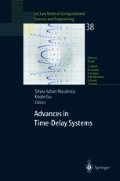Abstract
Design and implementation of now control problems pose challenging difficulties as the now dynamics are governed by coupled nonlinear equations. Recent research outcomes stipulate that the problem can be studied either from a reduced order modeling point of view or from a transfer function point of view. The latter idcntifies the physics of the problem on the basis of separate components such as scattering, acoustics, shear layer etc. This chapter uses the transfer function representation and demonstrates a good match between the real-time observations and a well-tuned transfer function can be obtained. Utilizing the devised model, an H∞ controller based on Toker-Özbay formula is presented. The simulati on results illustrate that the effect of the noise can be eliminated significantly by appropriately exciting the now dynamics.
Access this chapter
Tax calculation will be finalised at checkout
Purchases are for personal use only
Preview
Unable to display preview. Download preview PDF.
References
Ravindran SS ([2000]). A Reduced Order Approach for Optimal Control of Fluids Using Proper Orthogonal Decomposition. International Journal for Numerical Methods in Fluids, 34:425–488.
Atwell JA, King BB ([2001]). Proper Onhogonal Decomposition for Reduced Basis Feedback Controllers for Parabolic Equations. Mathematical and Computer Modelling of Dynamical Systems, 33: 1–19.
Williams DR, Rowley CW, Colonius T, Murray RM, MacMartin DG, Fabris D, Albenson J ([2002]). Model Based Control of Cavity Oscillations Pan I: Experiments. 40th Aerospace Sciences Meeting (AIAA 2002-0971), Reno, NY.
Rowley CW, Williams DR, Colonius T, Murray RM, MacManin DG, Fabris D ([2002]). Model Based Control of Cavity Oscillations Pan II: System Identification and Analysis. 40th Aerospace Sciences Meeting (AiAA 2002-0972), Reno, NY.
Rowley CW, Colonius T, Murray RM ([2001]). Dynamical Models for Control of Cavity Oscillations. 7th AIAA/CEAS Aeroacoustics Conf. (AIAA 2001-2126), May 28–30, Maastricht, The Netherlands.
Toker O, Özooy H ([1995]). H∞ Optimal and Suboptimal Controllers for Infnite Dimensional SISO Plants. IEEE Transactions on Automatic Control, 40:751–755.
Author information
Authors and Affiliations
Editor information
Editors and Affiliations
Rights and permissions
Copyright information
© 2004 Springer-Verlag Berlin Heidelberg
About this paper
Cite this paper
Yuan, X., Önder Efe, M., Özbay, H. (2004). On Delay-Based Linear Models and Robust Control of Cavity Flows. In: Niculescu, SI., Gu, K. (eds) Advances in Time-Delay Systems. Lecture Notes in Computational Science and Engineering, vol 38. Springer, Berlin, Heidelberg. https://doi.org/10.1007/978-3-642-18482-6_21
Download citation
DOI: https://doi.org/10.1007/978-3-642-18482-6_21
Publisher Name: Springer, Berlin, Heidelberg
Print ISBN: 978-3-540-20890-7
Online ISBN: 978-3-642-18482-6
eBook Packages: Springer Book Archive

